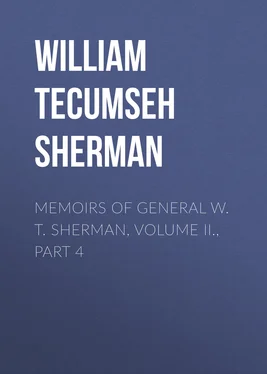William Tecumseh Sherman - Memoirs of General W. T. Sherman, Volume II., Part 4
Здесь есть возможность читать онлайн «William Tecumseh Sherman - Memoirs of General W. T. Sherman, Volume II., Part 4» — ознакомительный отрывок электронной книги совершенно бесплатно, а после прочтения отрывка купить полную версию. В некоторых случаях можно слушать аудио, скачать через торрент в формате fb2 и присутствует краткое содержание. Жанр: Биографии и Мемуары, История, foreign_edu, foreign_antique, foreign_prose, на английском языке. Описание произведения, (предисловие) а так же отзывы посетителей доступны на портале библиотеки ЛибКат.
- Название:Memoirs of General W. T. Sherman, Volume II., Part 4
- Автор:
- Жанр:
- Год:неизвестен
- ISBN:нет данных
- Рейтинг книги:5 / 5. Голосов: 1
-
Избранное:Добавить в избранное
- Отзывы:
-
Ваша оценка:
- 100
- 1
- 2
- 3
- 4
- 5
Memoirs of General W. T. Sherman, Volume II., Part 4: краткое содержание, описание и аннотация
Предлагаем к чтению аннотацию, описание, краткое содержание или предисловие (зависит от того, что написал сам автор книги «Memoirs of General W. T. Sherman, Volume II., Part 4»). Если вы не нашли необходимую информацию о книге — напишите в комментариях, мы постараемся отыскать её.
Memoirs of General W. T. Sherman, Volume II., Part 4 — читать онлайн ознакомительный отрывок
Ниже представлен текст книги, разбитый по страницам. Система сохранения места последней прочитанной страницы, позволяет с удобством читать онлайн бесплатно книгу «Memoirs of General W. T. Sherman, Volume II., Part 4», без необходимости каждый раз заново искать на чём Вы остановились. Поставьте закладку, и сможете в любой момент перейти на страницу, на которой закончили чтение.
Интервал:
Закладка:
The first night out we camped by the road-side near Lithonia. Stone Mountain, a mass of granite, was in plain view, cut out in clear outline against the blue sky; the whole horizon was lurid with the bonfires of rail-ties, and groups of men all night were carrying the heated rails to the nearest trees, and bending them around the trunks. Colonel Poe had provided tools for ripping up the rails and twisting them when hot; but the best and easiest way is the one I have described, of heating the middle of the iron-rails on bonfires made of the cross-ties, and then winding them around a telegraph-pole or the trunk of some convenient sapling. I attached much importance to this destruction of the railroad, gave it my own personal attention, and made reiterated orders to others on the subject.
The next day we passed through the handsome town of Covington, the soldiers closing up their ranks, the color-bearers unfurling their flags, and the bands striking up patriotic airs. The white people came out of their houses to behold the sight, spite of their deep hatred of the invaders, and the negroes were simply frantic with joy. Whenever they heard my name, they clustered about my horse, shouted and prayed in their peculiar style, which had a natural eloquence that would have moved a stone. I have witnessed hundreds, if not thousands, of such scenes; and can now see a poor girl, in the very ecstasy of the Methodist "shout," hugging the banner of one of the regiments, and jumping up to the "feet of Jesus."
I remember, when riding around by a by-street in Covington, to avoid the crowd that followed the marching column, that some one brought me an invitation to dine with a sister of Sam. Anderson, who was a cadet at West Point with me; but the messenger reached me after we had passed the main part of the town. I asked to be excused, and rode on to a place designated for camp, at the crossing of the Ulcofauhachee River, about four miles to the east of the town. Here we made our bivouac, and I walked up to a plantation-house close by, where were assembled many negroes, among them an old, gray-haired man, of as fine a head as I ever saw. I asked him if he understood about the war and its progress. He said he did; that he had been looking for the "angel of the Lord" ever since he was knee-high, and, though we professed to be fighting for the Union, he supposed that slavery was the cause, and that our success was to be his freedom. I asked him if all the negro slaves comprehended this fact, and he said they surely did. I then explained to him that we wanted the slaves to remain where they were, and not to load us down with useless mouths, which would eat up the food needed for our fighting men; that our success was their assured freedom; that we could receive a few of their young, hearty men as pioneers; but that, if they followed us in swarms of old and young, feeble and helpless, it would simply load us down and cripple us in our great task. I think Major Henry Hitchcock was with me on that occasion, and made a note of the conversation, and I believe that old man spread this message to the slaves, which was carried from mouth to mouth, to the very end of our journey, and that it in part saved us from the great danger we incurred of swelling our numbers so that famine would have attended our progress. It was at this very plantation that a soldier passed me with a ham on his musket, a jug of sorghum-molasses under his arm, and a big piece of honey in his hand, from which he was eating, and, catching my eye, he remarked sotto voce and carelessly to a comrade, "Forage liberally on the country," quoting from my general orders. On this occasion, as on many others that fell under my personal observation, I reproved the man, explained that foraging must be limited to the regular parties properly detailed, and that all provisions thus obtained must be delivered to the regular commissaries, to be fairly distributed to the men who kept their ranks.
From Covington the Fourteenth Corps (Davis's), with which I was traveling, turned to the right for Milledgeville, via Shady Dale. General Slocum was ahead at Madison, with the Twentieth Corps, having torn up the railroad as far as that place, and thence had sent Geary's division on to the Oconee, to burn the bridges across that stream, when this corps turned south by Eatonton, for Milledgeville, the common "objective" for the first stage of the "march." We found abundance of corn, molasses, meal, bacon, and sweet-potatoes. We also took a good many cows and oxen, and a large number of mules. In all these the country was quite rich, never before having been visited by a hostile army; the recent crop had been excellent, had been just gathered and laid by for the winter. As a rule, we destroyed none, but kept our wagons full, and fed our teams bountifully.
The skill and success of the men in collecting forage was one of the features of this march. Each brigade commander had authority to detail a company of foragers, usually about fifty men, with one or two commissioned officers selected for their boldness and enterprise. This party would be dispatched before daylight with a knowledge of the intended day's march and camp; would proceed on foot five or six miles from the route traveled by their brigade, and then visit every plantation and farm within range. They would usually procure a wagon or family carriage, load it with bacon, corn-meal, turkeys, chickens, ducks, and every thing that could be used as food or forage, and would then regain the main road, usually in advance of their train. When this came up, they would deliver to the brigade commissary the supplies thus gathered by the way. Often would I pass these foraging-parties at the roadside, waiting for their wagons to come up, and was amused at their strange collections–mules, horses, even cattle, packed with old saddles and loaded with hams, bacon, bags of cornmeal, and poultry of every character and description. Although this foraging was attended with great danger and hard work, there seemed to be a charm about it that attracted the soldiers, and it was a privilege to be detailed on such a party. Daily they returned mounted on all sorts of beasts, which were at once taken from them and appropriated to the general use; but the next day they would start out again on foot, only to repeat the experience of the day before. No doubt, many acts of pillage, robbery, and violence, were committed by these parties of foragers, usually called "bummers;" for I have since heard of jewelry taken from women, and the plunder of articles that never reached the commissary; but these acts were exceptional and incidental. I never heard of any cases of murder or rape; and no army could have carried along sufficient food and forage for a march of three hundred miles; so that foraging in some shape was necessary. The country was sparsely settled, with no magistrates or civil authorities who could respond to requisitions, as is done in all the wars of Europe; so that this system of foraging was simply indispensable to our success. By it our men were well supplied with all the essentials of life and health, while the wagons retained enough in case of unexpected delay, and our animals were well fed. Indeed, when we reached Savannah, the trains were pronounced by experts to be the finest in flesh and appearance ever seen with any army.
Habitually each corps followed some main road, and the foragers, being kept out on the exposed flank, served all the military uses of flankers. The main columns gathered, by the roads traveled, much forage and food, chiefly meat, corn, and sweet-potatoes, and it was the duty of each division and brigade quartermaster to fill his wagons as fast as the contents were issued to the troops. The wagon-trains had the right to the road always, but each wagon was required to keep closed up, so as to leave no gaps in the column. If for any purpose any wagon or group of wagons dropped out of place, they had to wait for the rear. And this was always dreaded, for each brigade commander wanted his train up at camp as soon after reaching it with his men as possible.
Читать дальшеИнтервал:
Закладка:
Похожие книги на «Memoirs of General W. T. Sherman, Volume II., Part 4»
Представляем Вашему вниманию похожие книги на «Memoirs of General W. T. Sherman, Volume II., Part 4» списком для выбора. Мы отобрали схожую по названию и смыслу литературу в надежде предоставить читателям больше вариантов отыскать новые, интересные, ещё непрочитанные произведения.
Обсуждение, отзывы о книге «Memoirs of General W. T. Sherman, Volume II., Part 4» и просто собственные мнения читателей. Оставьте ваши комментарии, напишите, что Вы думаете о произведении, его смысле или главных героях. Укажите что конкретно понравилось, а что нет, и почему Вы так считаете.












